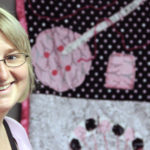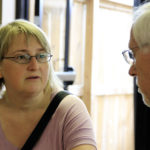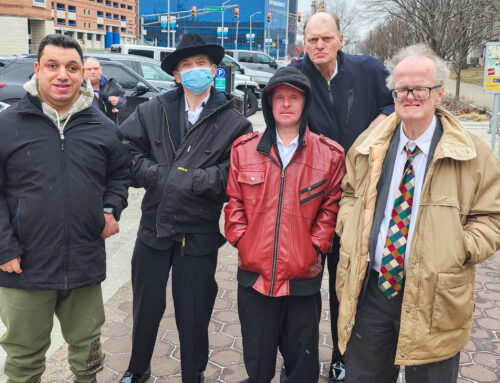If imitation is the highest form of flattery, then ADEC soon will be getting rave reviews. Nataliya Bordun, a visiting professor from the Ukraine, learned new ways to serve adults with intellectual disabilities by seeing what works here. When she returned home last week, she took with her several of our ideas to try there.
At Mackey Group Home in South Bend, Nataliya liked the way records are kept and shared by staff and the way personal goals are set for each individual. At Mishawaka Day Services, she loved the colorful daily schedule posted large enough for clients to read, the practice of morning coffee break and the sewing and woodworking projects. She also liked the idea of accreditation and being held to high standards by an accrediting organization like CARF.
Nataliya spent the month of August in South Bend teaching and conducting research at the University of Notre Dame’s Nanovic Institute. Her professional subject is leadership – she’s on staff at the Institute of Leadership and Management in Lviv – but she also has a personal interest in advocating for and supporting adults with intellectual disabilities. She serves on the board of directors of a L’Arche community at her university, where adults with disabilities live on campus, sharing dormitory and housing space with students and professors. Her interest in serving the disabled brought her to ADEC. That and a friendship with one of ADEC’s direct support professionals, Roman Borszcz. Roman set up the visits to Mackey and Mishawaka Day Services and served as her tour guide.
Nataliya saw a lot of similarities between ADEC and the L’Arche community in the Ukraine. The concept of community and integration are key in both places, she said. “In our places, we help each other. We work together. We involve the higher functioning people to help the lower functioning.”
Among the differences were numbers served and funding sources. Families in the Ukraine do not get government assistance to pay for services, she explained. Families pay for it and consequently remain very involved. Service sites in the Lviv also are much smaller, involving fewer people for shorter periods of time. Residential services there are more like our version of respite. Clients come for temporary stays rather than long-term placement.
Traveling and seeing best practices in other places brings “new energy to community,” Nataliya said, inviting her new ADEC acquaintances to visit her in Lviv, so she can reciprocate the hospitality.
- Nataliya Bordun stands by a quilt made by clients at ADEC’s Mishawaka Day Services.
- Cary Kelsey (right), vice president compliance/guardianship, talks with Nataliya about accreditation.
- Heather Kraus, manager of ADEC’s Mishawaka Day Services, shows Nataliya Bordun the daily schedule.
- Heather Kraus shows Nataliya Bordun one of the vocational projects, quilt making.
















